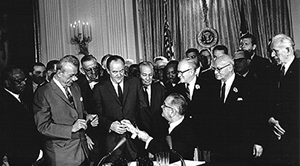"Well they passed a law in '64
To give those who ain't got a little more
But it only goes so far
Because the law don't change another's mind...
That's
just the way it is
Some things will never change
That's just the way it is
But don't you believe them"
~ Bruce Hornsby - The Way It Is
The Way It Is ©1986
Civil Rights Act of 1964
President Johnson welcomed the bill he had
sought for so long. Within a few hours of passage, he signed it into law in a
nationwide television broadcast from the White House. On
We believe that all men are created
equal - yet many are denied equal treatment. We believe that all
men have certain inalienable rights. We believe that all men are entitled to
the blessings of liberty - yet millions are being deprived of those blessings,
not because of their own failures, but because of the color of their skins.
The reasons are deeply embedded in history
and tradition and the nature of man. We can understand without rancor or hatred
how all this happens. But it cannot continue. Our Constitution, the foundation
of our Republic, forbids it. The principles of our freedom forbid it. Morality
forbids it. And the law I sign tonight forbids it...

Lyndon Johnson signs the Civil
Rights Act of 1964
"It
may be true that the law cannot make a man love me,
but it can keep him from lynching me,
and I think that's pretty important."
~ Martin Luther King, Jr.
"Laws
alone can not secure freedom of expression;
in order that every man present his views without penalty
there must be spirit of tolerance in the entire population."
~ Albert Einstein
Major Features of the Civil Rights Act of 1964
(Public Law 88-352)
Title I
Barred unequal application of voter registration requirements, but did not
abolish literacy tests sometimes used to disqualify African Americans and poor
white voters.
Title II
Outlawed discrimination in hotels, motels, restaurants, theaters, and all other
public accommodations engaged in interstate commerce; exempted private clubs
without defining "private," thereby allowing a loophole.
Title III
Encouraged the desegregation of public schools and authorized the
Title IV
Authorized but did not require withdrawal of federal funds from programs which
practiced discrimination.
Title V
Outlawed discrimination in employment in any business exceeding twenty five
people and creates an Equal Employment Opportunities Commission to review
complaints, although it lacked meaningful enforcement powers.
NOTE: The text of the entire
act is posted at http://usinfo.state.gov/usa/infousa/laws/majorlaw/civilr19.htm
Source: CongressLink: "Major
Features of the Civil Rights Act of 1964."